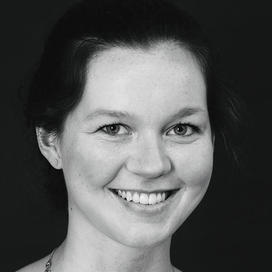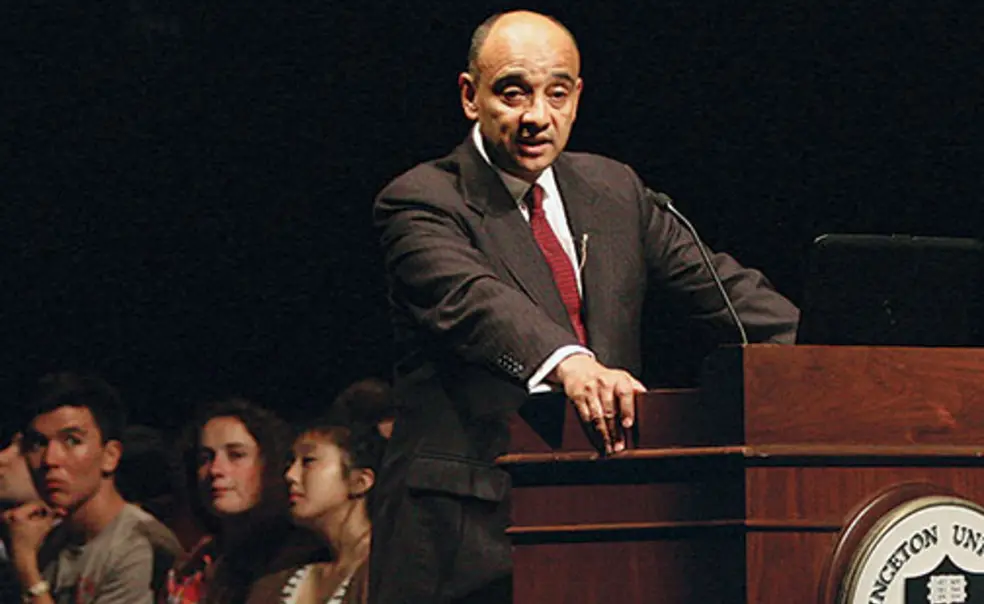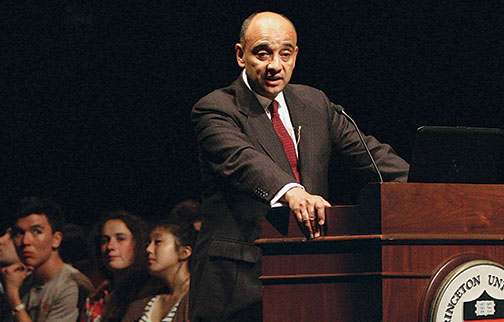Student Dispatch: Taking Eisgruber’s ‘Pre-read’ Challenge, Freshmen Grapple with Concepts of Honor
President Eisgruber ’83 gave this year’s freshmen a provocative topic for their first intellectual conversations at Princeton. Think about the role of honor in your life, he said, and question it.
Philosophy professor Kwame Anthony Appiah’s book — The Honor Code: How Moral Revolutions Happen — was sent by the University to the Class of 2017 over the summer for what was termed the “Pre-read”: an introduction to scholarly life at Princeton. Eisgruber told the freshmen that he hoped they would “remember the question that motivates Professor Appiah’s book — the question of what it means to live a successful human life.”
The Honor Code details the role of honor in prompting moral revolutions such as the end of dueling, Atlantic slavery, and foot binding in China, and on the evening of Opening Exercises, Appiah spoke about its relevance today. “Honor already matters in your lives right now,” he told the freshmen gathered in McCarter Theatre, and as he opened the session to questions, he urged the students “to tell me why I’m wrong.”

One student posed a real-life question. “You discuss all of these moral revolutions — but I wonder how it might be able to happen on a more microscopic level, like on a university level,” she said. She told Appiah that her class recently had learned of a survey that reported one in nine Princeton students experience some form of sexual violence or harassment.
“How do we, on a campus level, create that turnaround or begin to make that change?” the student asked, prompting applause. Appiah said that in the moral revolutions he had studied, change took about a generation. He counseled patience.
Following Appiah’s talk, the issue continued to resonate during small-group discussions in the residential colleges. In one session, students took issue with the professor. “At Princeton, change can happen quickly,” said the senior leading the discussion. She urged the freshmen to take action if they saw something they didn’t like.
“Do you think an honor system can make people act dishonorably?” one student asked his peers. “What’s the difference between honor and respect?” asked another.
While the topic of academic honesty came up, several students said that they had had an honor code in high school and did not need another lecture on it. Nabil Shaikh ’17 said that Appiah’s book was most valuable in approaching the subject of honor from new angles: “It probed deeper questions.”













1 Response
Reid Pitts Jr. ’63
10 Years AgoHonor Religious Heritage
“Honor already matters in your lives right now,” Professor Kwame Anthony Appiah told a gathering of the freshman class (Student Dispatch, Oct. 9). You bet it does!
Without the Judeo-Christian ethic there is no capitalism, scientific method, academic freedom, democracy, rule of law, or property rights.
It means something when Princeton drops its motto, “Dei sub numine viget” (under God’s power she flourishes), from publications including the Chapel’s Order of Worship. It means something when Princeton ended mandatory Chapel in 1964. It means something when Princeton’s former president, a molecular biologist, declares the atmosphere behaves like a greenhouse, hires a faculty member who has been a green lobbyist for 20 years and who states that his purpose is “to teach the new generation about global warming,” hires an adjunct professor for journalism who was the climate-change reporter for Time, and institutes a politically correct speech code.
Yes, it takes courage to speak up, but without courage there are no other virtues (Plato). Honor and integrity are like virginity — once lost, never regained. Princeton’s reputation as a world-class college with a research university appended has been lost.